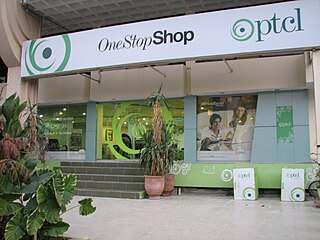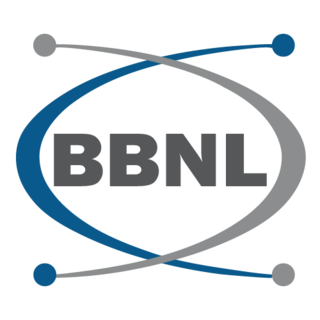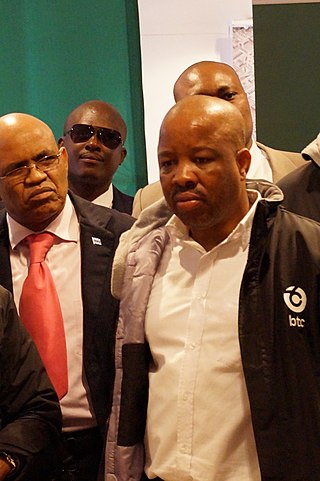Related Research Articles

Telecommunications in Australia refers to communication in Australia through electronic means, using devices such as telephone, television, radio or computer, and services such as the telephony and broadband networks. Telecommunications have always been important in Australia given the "tyranny of distance" with a dispersed population. Governments have driven telecommunication development and have a key role in its regulation.

Emirates Telecommunications Group Company PJSC, doing business as etisalat and, is a UAE state-owned telecommunications company. It is the 18th largest mobile network operator in the world by number of subscribers.

Internet Protocol television (IPTV) is the delivery of television content over Internet Protocol (IP) networks. This is in contrast to delivery through traditional terrestrial, satellite, and cable television formats. Unlike downloaded media, IPTV offers the ability to stream the source media continuously. As a result, a client media player can begin playing the content almost immediately. This is known as streaming media.

Telekom Malaysia Berhad or simply TM is a Malaysian telecommunications company founded in 1984. Beginning as the national telecommunications company for fixed line, radio, and television broadcasting services, it has evolved to become the country's largest provider of broadband services, data, fixed line, pay television, and network services. TM ventured into the LTE space with the launch of TMgo, its 4G offering. TM's 850 MHz service was rebranded as unifi Mobile in January 2018.

Allstream is a business communications provider based in Mississauga, Ontario, Canada, that provides Internet Protocol (IP) connectivity, managed IP services, unified communications and voice services to its customers in the United States and Canada.

PLDT, Inc., formerly known as the Philippine Long Distance Telephone Company, is a Philippine telecommunications, internet and digital service company.

BTC is the primary telecommunications provider for the Bahamas, headquartered in Nassau, New Providence. It is partly government owned and offers telephone, internet and wireless services.
AAPT is a fixed-line telecommunications company owned by TPG Telecom. It owns significant fibre and internet infrastructure in Australia. Its national network offers data, cloud, voice and internet services.

Ethio telecom, previously known as the Ethiopian Telecommunications Corporation, is an Ethiopian telecommunication company serving as the major internet and telephone service provider. Ethio telecom is owned by the Ethiopian government and maintains a monopoly over all telecommunication services in Ethiopia. Based in Addis Ababa, it is one of the "Big-5" group of state owned corporations in Ethiopia, along with Ethiopian Airlines, the Commercial Bank of Ethiopia, Ethiopian Insurance Corporation, and the Ethiopian Shipping Lines.

Pakistan Telecommunication Company Ltd., commonly known as PTCL is the national telecommunication company in Pakistan. PTCL provides telephone and internet services nationwide and is the backbone for the country's telecommunication infrastructure. The corporation manages and operates around 2000 telephone exchanges across the country, providing the largest fixed-line network. Data and backbone services such as GSM, HSPA+, CDMA, LTE, broadband internet, IPTV, and wholesale are an increasing part of its business.
Transgrid is the manager and operator of the high voltage electricity transmission network in New South Wales and the Australian Capital Territory, Australia, and is part of the National Electricity Market (NEM). The company's offices are located in Sydney, Newcastle, Orange, Tamworth, Wagga, and Yass.

BTCL or Bangladesh Telecommunications Company Limited is the largest telecommunications company in Bangladesh. The company was founded as the Bangladesh Telegraph & Telephone Board (BTTB) following Bangladesh's independence in 1971. On July 1, 2008 the BTTB became a public limited company and was renamed as BTCL. The Bangladesh government initially owned all BTCL shares, but stated it would sell the shares to the public the following year. The estimated value of BTCL is ৳15,000 crore. BTCL has a total of 12,636 officials and staff.
ALBtelecom sh.a. was an Albanian telecommunications company. It was established as Albania's state company that provided telecommunications services through a fixed network. On 5 December 1912 the Provisional Government led by Ismail Qemali established the Ministry of Post Telegraph Telephones, where ALBtelecom existed only as a government office. It is the largest fixed line telephone company in the country, currently covering with Optical Fiber Backbone Network the entire territory of Albanian cities.
Uganda Telecommunications Corporation Limited (UTCL), also (UTel), is an information and communication technology network company in Uganda owned by the government of Uganda. UTel acquired the assets and some of the liabilities of the defunct Uganda Telecom Limited (UTL) which was also owned by the Ugandan government. UTL was previously in receivership which it entered after the Libyan company that owned about 69 percent shares abandoned the investment in 2017.
Botswana Telecommunications Authority (BTA) is a dissolved independent commission that was responsible for regulating all matters related to telecommunications, postal services of Botswana and has been succeeded by Botswana Communications Regulatory Authority. The Minister appoints all five board members, who serve on a part-time basis. The BTA is mandated to promote the development and provision of efficient telecommunications and broadcasting services in Botswana, under the terms of the Telecommunications Act 15 of 1996. There have been legal disputes between the BTA and licensed operators, springing from issues related to interconnection and pricing.

BharatNet, also known as Bharat Broadband Network Limited (BBNL), is a central public sector undertaking, set up by the Department of Telecommunications, a department under Ministry of Communications of the Government of India for the establishment, management, and operation of the National Optical Fibre Network to provide a minimum of 100 Mbit/s broadband connectivity to all 250,000-gram panchayats in the country, covering nearly 625,000 villages, by improving the middle layer of nation-wide broadband internet in India to achieve the goal of Digital India.

Zayo Group Holdings, Inc., or Zayo Group, is a privately held company headquartered in Boulder, Colorado, U.S. with European headquarters in London, England. The company provides communications infrastructure services, including fiber and bandwidth connectivity, colocation and cloud infrastructure. Zayo's primary customer segments include wireless carriers, national carriers, ISPs, enterprises and government agencies. Zayo Group was built largely through acquisitions; it took over thirty companies from 2007 to 2014, including AboveNet and 360networks. The company completed an initial public offering of stock raising $600 million in 2014. In 2020, Zayo Group was taken private by global investment firms EQT Partners and Digital Colony Partners in a deal valued at $14.3 billion.

Anthony Masunga is the chief operating officer for Botswana Telecommunications Corporation, from the previous appointment of being a general manager and acting manager commercial. The Francistown-born Anthony Masunga started working as a chief operating officer and chief executive officer in January 2017.
Botswana Fibre Networks (BOFINET) is the wholesale provider of national and international telecommunication infrastructure in Botswana formed in 2012 to focus on and improve the backbone network and internet infrastructure of Botswana.
Goabaone Taylor is a Motswana accountant and sports administrator who served as the chief executive officer of Botswana Football Association between April and December 2021. She occupied this position with effect from 1 April 2021 making her the first female to occupy this position since the inception of the organisation in 1966.
References
- ↑ "Botswana Telecommunications Corporation Website". Archived from the original on 18 April 2010. Retrieved 20 July 2010.
- ↑ "Telecommunications Reform In Botswana: a Policy Model for African States".
- ↑ "History of Communication Regulation".
- ↑ "Home". BTC. Retrieved 9 May 2024.
- ↑ "BSE listings" (PDF).
- ↑ "Archived copy" (PDF). Archived from the original (PDF) on 6 July 2011. Retrieved 21 July 2010.
{{cite web}}: CS1 maint: archived copy as title (link) . Retrieved 07-13-2010 - ↑ "The Botswana Gazette Newspaper". Archived from the original on 8 December 2009. Retrieved 31 July 2010.
- ↑ Business Week
- ↑ "BTCL listing" . Retrieved 15 September 2016.
- ↑ "BTCL MD, Paul Taylor leaves after 5 years" . Retrieved 14 September 2016.
